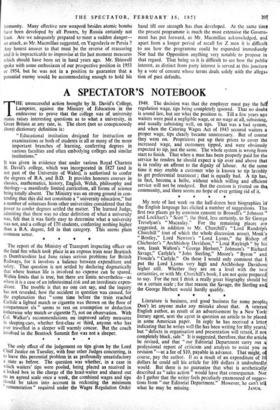The only effect of the judgement on tips given by
the Lord Chief Justice on Tuesday, with four other Judges concurring, is to leave this perennial problem in as profoundly unsatisfactory a state as before. The question was whether, in a case in which waiters' tips were pooled, being placed as received in a locked box in the charge of the head-waiter and shared out on an agreed scale once a week, the combined wages and tips Should be taken into account in reckoning the minimum remuneration" required under the Wages Regulation Order 1949. The decision was that the employer must pay the fuli regulation wage, tips being completely ignored. That no doubt is sound law, but see what the position is. Till a few years ago waiters were paid a negligible wage, or no wage at all, subsisting, and usually subsisting well, on tips. That was a bad system, and when the Catering Wages Act of 1943 secured waiters a proper wage, tips clearly became unnecessary. But of course they went on. Proprietors put up their prices to cover the increased wage, and customers tipped, and were obviously expected to tip, just the same. The whole system is wrong from start to finish. That when a man has been properly paid for the service he renders he should expect a tip over and above that is in reality an affront to the dignity of labour. At the same time it may enable a customer who is known to tip lavishly to get preferential treatment ; that is equally bad. A tip has. in fact, become a bribe, without which willing and efficient service will not be rendered. But the custom is riveted on the% community, and there seems no hope of ever getting rid of it.


































 Previous page
Previous page